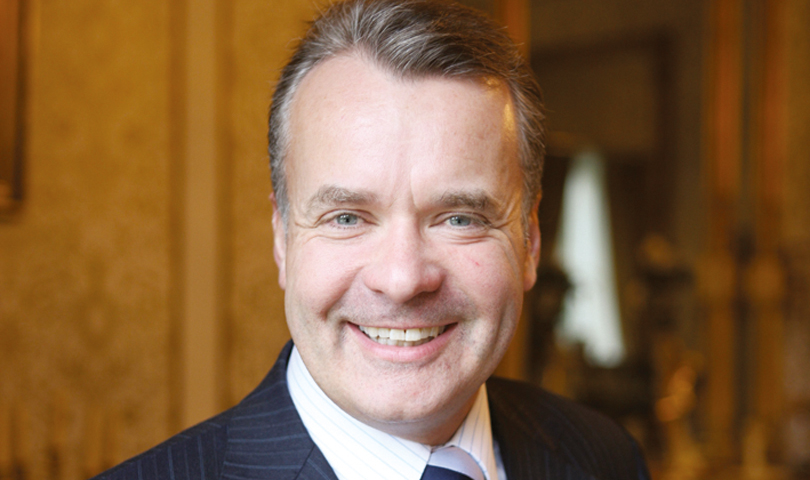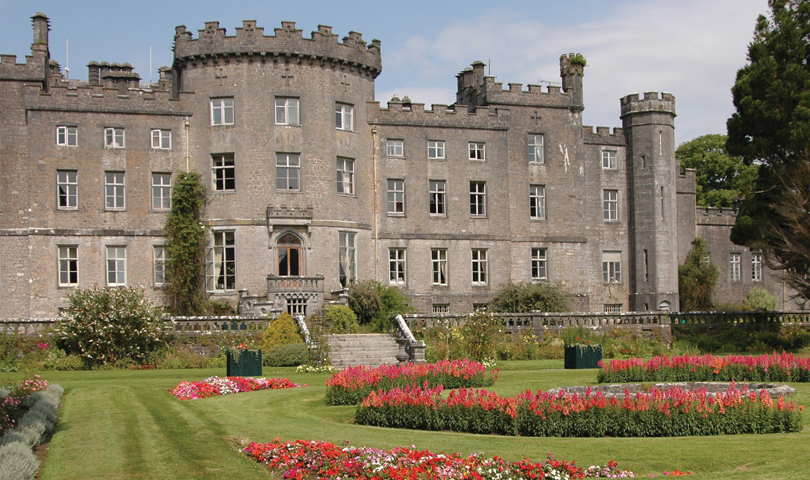The Corscadden clan have been storming castles in Ireland for decades, but at least they are accommodating owners. Four generations of Corscaddens have worked in the Irish hospitality sector, and a series of canny purchases at opportune times has seen their portfolio of prestigious Irish castle hotels grow to four, one in each province.
The family’s most recent acquisition was Markree Castle in Sligo, bought for an undisclosed sum and earmarked for a €5m restoration by its new owners. The other three Corscadden keeps are Cabra Castle in Cavan, Bellingham Castle in Louth and Ballyseede Castle in Kerry.
Business is good for the family too, having seen out the recession by keeping their heads below the ramparts and tempering their outlay. Kingscourt Castle Ltd, the parent company for Cabra Castle, Bellingham Castle and Ballyseede Castle, had a net worth of €6.8m at the end of 2013.
Currently, Howard Corscadden (51) and his brother Adam (45), along with their respective wives, run Cabra Castle, while his other brother, Patrick (40), operates Bellingham Castle with his partner. Marnie (48), another Corscadden sibling, manages Ballyseede Castle with her husband. All are pitching in to operate Markree Castle, following its acquisition in June.
Cut-Throat
According to Howard Corscadden (pictured), the family have purposely stayed away from conventional hotels. “The hotels business is too cut-throat and it’s easier to get customers in when you have a castle,” he says. He sees the castle conquest as a high-stakes, high-reward enterprise, with purchases and renovations costing in the high millions, offset by steady business from domestic and international customers.
One of the reasons why the Corscadden portfolio managed to withstand the recession reasonably intact, says Howard, is because the businesses were financed primarily from cashflow and cash balances. As a result, banks weren’t beating down the castle doors. “My mother Mitzie is in her 80s but is still involved in the family business,” adds Howards “She didn’t let us go wild during the Celtic Tiger.”
Howard Corscadden’s grandparents started the family down the hotelier path when they ran the International Hotel in Bray during the ‘40s and ‘50s, where its Arcadia Ballroom did a roaring trade with showbands. Their three sons subsequently went into the hotel business, buying properties in Meath, Kildare, Wicklow and in England.
Hospital Conversion
One of them, Pappy, and his wife, Mitzie, branched off in the ‘60s and converted the old regional hospital in Kildare Town into the Derby House Hotel, which ran until the 1990s. It was there that Howard and his siblings got their first taste of the hotel trade.
“Having grown up in it, I was always interested in hospitality,” Howard recalls. “I worked in the Derby House from a very young age and I liked it.” When he finished school, Howard went to study in Shannon College of Hotel Management, followed by his sister. Their studies required them to work abroad and the Corscaddens cut their teeth in hotels in Switzerland, the Bahamas and the UK.
“You have to go abroad to appreciate where the industry is going, what international standards are like and so on. When you come back, you can then introduce what you learned to the business at home.”
Howard Corscadden spent the fourth year of his Shannon course working in the Waldorf in London. “I worked in the back of house with Bangladeshis and Pakistanis, and it was an eye opener. I was responsible for the cleaning, the washing up and the stock take – the unglamorous side of it.” Returning to Ireland, Howard took up work in Dromoland Castle Hotel, leaving there as deputy general manager in 1991.
Cabra Castle Purchase
In 1991, Howard’s parents bought Cabra Castle, a quasi-Norman Gothic castle built in Cavan in the early 19th century. Converted into a hotel in the ‘60s, the building was bought by Middle East owners in the ‘80s. They closed the hotel with a view to using the castle as a private dwelling but departed Ireland due to political instability at home, which left the castle idle for years.
The timing of the Cabra acquisition was good, given the recessionary hangover Ireland was labouring under at the time and the fact that castle hotels were still a relative novelty in Ireland. The Corscaddens brought their children into the Cabra Castle venture and built the hotel up from a 22-bedroom venue to its current capacity of 110 bedrooms.
In 2005, by which time the Cabra Castle operating company had a net worth of €5m and had amassed a cash pile of €1m, the Corscaddens bought Ballyseede Castle in Kerry. Set in 30 acres of woodland, the much-altered building has been around since the 1590s. Now a four-star hotel, Ballyseede has 20 bedrooms and is popular with tourists and wedding parties. Marnie Corscadden took over the running of Ballyseede once it came into the family’s ownership, while the three brothers looked after Cabra Castle.
Under The Radar
The Corscadden family’s third castle purchase came in 2012 when they acquired Bellingham Castle for around €1m. The timing was again opportune, as the recession had torn to shreds the 2008 asking price of €7m. The 17th century castle includes 17 acres of land and was on the market for a number of years. “Bellingham snuck under the radar because not many people knew it as a castle hotel. It was known more as a local venue for discos and dances,” says Howard, whose youngest brother, Patrick, now manages the venue.
The purchase of Markree Castle in 2015 – the first time the castle has changed hands since Cromwell gifted it to the Cooper family in the mid-17th century – is another big move by the Corscaddens. The facility is currently closed as the family embark on a major upgrade and refurbishment programme at the property.
Howard says that his is a hands-on role in Cabra Castle, working as duty manager in the morning, then travelling to nearby Bellingham Castle in the afternoon. “We try to have a Corscadden on duty at all times in all of our hotels.”
Special Occasion
Aside from the day-to-day job variety, which Howard says he enjoys, his other cap is as an antiques buyer. “All of these castles take a lot of antiques, especially paintings and period pieces. You can’t just put Ikea furniture in the castle and stick up prints in the walls. We put up our own pictures and a selection of antiques that my parents gathered over the years. We’re regarded as a ‘special occasion’ venue, so we’ll get the weddings, the anniversary, the romantic night away.”
Navigating the recession required a close watch on expenses, according to Howard, but the business survived without having to lay off any staff. “We didn’t have large bank repayments but we still cut our cloth to measure. This involved us all taking pay cuts, a recruitment ban and hours being cut back too.
“The falloff wasn’t as bad for us as it was in the wider hotel sector. A lot of hotels were built in the wrong locations; they should never have been constructed. However, we weren’t competing against mainstream hotels but other castles.”
Too Many Castles
The castle hotel/manor house sector has become far more competitive in recent years, Howard maintains. “Relaxed planning allowed a lot of this to happen. At least five or six new castle hotels opened during the Celtic Tiger years. When I was growing up there was only a handful of castle hotels, such as Ashford Castle and the Dromoland. Now there must be around two dozen castle hotels in the country.”
Overseas tourists account for around half of the Corscaddens’ guest intake, varying between destinations. The four hotels are part of Manor House Hotels, which markets independent luxury country house and castle hotels to domestic and overseas tourists. “You can’t underestimate the ‘castle’ aspect of the properties,” says Howard. “Any American who comes to Ireland has a mandatory one-night stay in a castle.”
Of the four castle hotels in Corscadden hands, Howard says that the four-star Cabra Castle is the top performer from a business perspective. “They’re all very distinctive. In terms of architecture and features, Markree Castle (pictured above) is the stand-out. Bellingham Castle is the most unique, in that you can rent out the entire castle, while the strongest tourist business is Ballyseede, because you have the lakes of Killarney on one side and Dingle on the other.”
Exceptional Hit
Kingscourt Castle Ltd, the group operating company, reported an operating profit of €385,000 in 2013 and €766,000 in 2012. The group booked an exceptional hit of €3.6m in 2012, which related to the write-off of amounts owed by a subsidiary company, Ballyline Castle Ltd, which appears to be involved in the Ballysede operation.
Prior to March 2013, Howard and Ann Corscadden were the sole directors of Kingscourt Castle Ltd. At that time they were joined on the board by Adam, Patrick and Marnie Corscadden. Directors’ remuneration for 2013 amounted to €308,000, plus €75,000 in pension contributions.
By 2016, Howard says that the four castles will be employing 400 staff, and one of the key challenges he sees in the pipeline is labour costs. “As the economy improves, sourcing and retaining quality staff will continue to be a challenge. Castles also don’t lend themselves to efficiency in work practices. Guest are everywhere, and you have large rooms and tall ceilings, so overheads such as heating and lighting will remain a concern.”
The castle-owning siblings are content to stay in their own domains for the most part when it comes to managing the business. Howard says that they have only once sat around a board table for a formal meeting. The family business is done over the phone or by talking shop at family get-togethers. “There’s a healthy rivalry between us. We’re always checking reviews online and seeing who’s doing the best, getting the best prices etc.”
Next Generation
The next generation of Corscaddens don’t have to worry about the business particulars as yet, although Howard’s three children do casual work in Cabra Castle. “I prefer my kids to go abroad first and do what they want to do. The business will be there for them if they want to but there’s no pressure on them from me.”
In the meantime, further castle acquisitions haven’t been ruled out, though not in the short-term. Says Howard: “The days of picking up a cheap castle have gone – I can’t imagine many more coming onto the market at a price that we could afford.”












